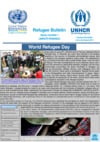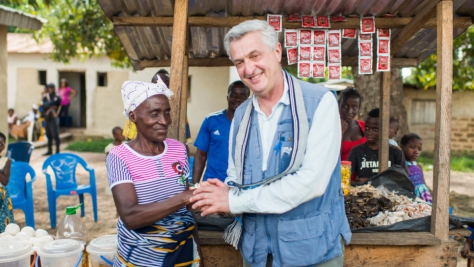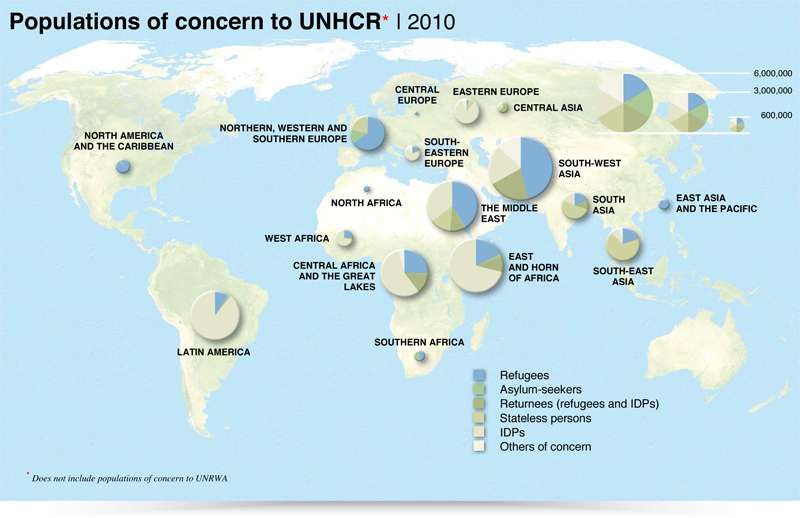World Refugee Day: UNHCR report finds 80 per cent of world's refugees in developing countries
The report reveals imbalance in international support for the world's forcibly displaced. Some of the poorest countries host huge refugee populations.
GENEVA, June 20 (UNHCR) - A UNHCR report released today reveals deep imbalance in international support for the world's forcibly displaced, with a full four-fifths of the world's refugees being hosted by developing countries - and at a time of rising anti-refugee sentiment in many industrialized ones.
UNHCR's 2010 Global Trends report shows that many of the world's poorest countries are hosting huge refugee populations, both in absolute terms and in relation to the size of their economies. Pakistan, Iran and Syria have the largest refugee populations at 1.9 million, 1.1 million and 1 million respectively.
Pakistan also has the biggest economic impact with 710 refugees for each US dollar of its per capita GDP (Gross Domestic Product), followed by Democratic Republic of the Congo and Kenya with 475 and 247 refugees respectively. By comparison, Germany, the industrialized country with the largest refugee population (594,000 people), has 17 refugees for each dollar of per capita GDP.
Overall, the picture presented by the 2010 report is of a drastically changed protection environment to that of 60 years ago when the UN refugee agency was founded. At that time UNHCR's caseload was 2.1 million Europeans, uprooted by World War Two. Today, UNHCR's work extends to more than 120 countries and encompasses people forced to flee across borders as well as those in flight within their own countries.
The 2010 Global Trends report shows that 43.7 million people are now displaced worldwide - roughly equalling the entire populations of Colombia or South Korea, or of Scandinavia and Sri Lanka combined. Within this total are 15.4 million refugees (10.55 million under UNHCR's care and 4.82 million registered with the UN Relief and Works Agency for Palestine Refugees), 27.5 million people displaced within their own country by conflict, and nearly 850,000 asylum-seekers, nearly one fifth of them in South Africa alone.
Particularly distressing are the 15,500 asylum applications by unaccompanied or separated children, most of them Somali or Afghan. The report does not cover displacement seen during 2011, including from Libya, Côte d'Ivoire and Syria.
"In today's world there are worrying misperceptions about refugee movements and the international protection paradigm," said António Guterres, UN High Commissioner for Refugees. "Fears about supposed floods of refugees in industrialized countries are being vastly overblown or mistakenly conflated with issues of migration. Meanwhile, it's poorer countries that are left having to pick up the burden."
Reflecting the prolonged nature of several of today's major international conflicts, the report finds that the refugee experience is becoming increasingly drawn-out for millions of people worldwide. UNHCR defines a protracted refugee situation as one in which a large number of people are stuck in exile for five years or longer.
In 2010, and of the refugees under UNHCR's mandate, 7.2 million people were in such a situation - more than at any time since 2001. Meanwhile only 197,600 people were able to return home, the lowest number since 1990.
Some refugees have been in exile for more than 30 years. Afghans, who first fled the Soviet invasion in 1979, accounted for a third of the world's refugees in both 2001 and in 2010. Iraqis, Somalis, Congolese (Democratic Republic of the Congo) and Sudanese were also among the top 10 nationalities of refugees at both the start and end of the decade.
"One refugee without hope is too many," said High Commissioner Guterres. "The world is failing these people, leaving them to wait out the instability back home and put their lives on hold indefinitely. Developing countries cannot continue to bear this burden alone and the industrialized world must address this imbalance. We need to see increased resettlement quotas. We need accelerated peace initiatives in long-standing conflicts so that refugees can go home."
Despite the low level of refugee returns last year, the situation for people displaced within their own countries - so-called internally displaced people, or IDPs - showed some movement. In 2010, more than 2.9 million IDPs returned home in countries including Pakistan, the Democratic Republic of the Congo, Uganda and Kyrgyzstan. Nonetheless even with these return levels, at 27.5 million people the global number of internally displaced was the highest in a decade.
A further but harder-to-quantify group that UNHCR cares for is stateless people, or people lacking the basic safety net of a nationality. The number of countries reporting stateless populations has increased steadily since 2004, but differences in definitions and methodologies still prevent reliable measurement of the problem.
In 2010, the reported number of stateless people (3.5 million) was nearly half of that in 2009, but mainly due to methodological changes in some countries that supply data. Unofficial estimates put the global number closer to 12 million. UNHCR will be launching a worldwide campaign in August this year to bring better attention to the plight of the world's stateless and to accelerate action to help them.
Your search for « World Refugee Day 2011 » matched 1280 results. Only the first 1,000 results are displayed. Displaying page 1 of 112 pages.
-

World Refugee Day: UNHCR chief appeals to industrialized world as annual celebrations get under way
20 Jun 2011 ... GENEVA, June 20 (UNHCR) - As UNHCR celebrated World Refugee Day during the agency's 60th anniversary year, High Commissioner António Guterres appealed on Monday to industrialized countries to do ...... -
Aidos Sagat and UNHCR
... in awareness events marking the annual World Refugee Day (June 20) and United Nations Day (October 24). ... He has also taken part in World Refugee Day events, including giving a piano recital in 2011 ...... -

Juanes
... Juanes also highlights the work of UNHCR around the world, supporting key events and campaigns, including World Refugee Day and the Nansen Refugee Award where he performed live in 2011. Through his ...... -

Millions to mark World Refugee Day as displacement crises persist
13 Jun 2012 ... week staff across the globe will take time to commemorate World Refugee Day and the millions they help. ... worldwide its eagerly awaited Global Trends 2011 report, which updates the number of people ...... -

World Refugee Day: UNHCR report finds 80 per cent of world's refugees in developing countries
20 Jun 2011 ... four-fifths of the world's refugees being hosted by developing countries - and at a time of rising anti-refugee sentiment in many ... The report does not cover displacement seen during 2011, including ...... -
High Commissioner's message for World Refugee Day, 20 June 2011
20 Jun 2011 ... ... It is a recognition that even one person forced to flee war or persecution, is one too many. I have chosen to spend this World Refugee Day in Europe, where the Refugee Convention was born, and in ...... -

UNHCR Rwanda Refugee Bulletin, Issue No.1
31 Aug 2011 ... Quarterly Newsletter June-July-August 2011 World Refugee Day Every year on June 20 th , UNHCR and its Partners celebrate World Refugee Day. In Rwanda, the event was marked in all refugee locations in ...... -

Anna Drijver
... Besides acting, she is a podcast maker and writer. In November 2011 her first novel ‘You ... Involvement with UNHCR In June 2020 and 2021, Anna supported the World Refugee Day partnership between ...... -

UNHCR's Grandi joins Ivorian refugees on the last leg of their journey home
19 Jun 2022 ... ... Since 2011, some 310,000 Ivorian refugees – ninety-six per cent of those living in West ... status coming to an end On the eve of World Refugee Day on 20 June, and with the number of people ......

